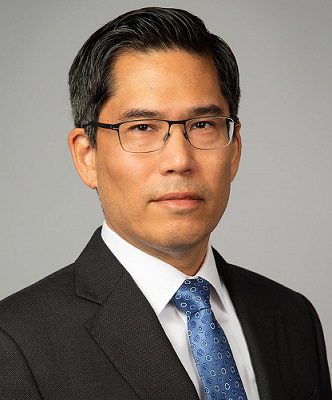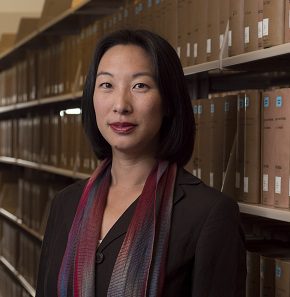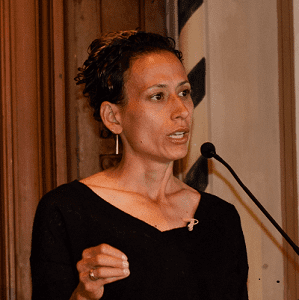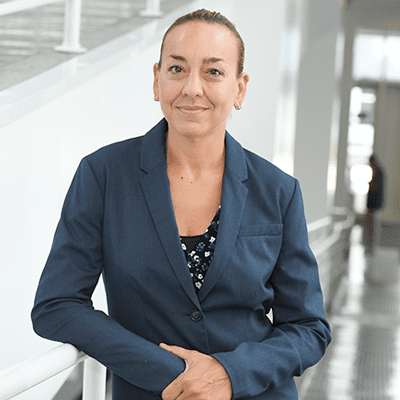UC Law SF Welcomes Four New Faculty Members This Fall
Four nationally-renowned scholars – with expertise in areas ranging from restorative justice to pharmaceutical law – are joining the faculty at UC Law SF College of the Law as Professors of Law this fall. The new professors are Hiro Aragaki, who specializes in alternative dispute resolution; Ming Hsu Chen, an expert in immigration law; Thalia Gonzaléz, a scholar who focuses on restorative justice; and Jenn Oliva, a health law scholar.
Provost Morris Ratner said, “UC Law SF is delighted to welcome this accomplished cohort of new faculty. Their research agendas place them at the cutting edge of important topics, including racial justice, immigration, health, restorative justice, and dispute resolution. They will enhance our classrooms, as well, bringing a rich variety of perspectives and theoretical approaches to the study of law.”
Meet the new professors:
Hiro Aragaki

Professor Hiro Aragaki
Aragaki is a specialist in alternative dispute resolution who is particularly interested in the intersection of contract law and civil procedure. He worked at Hastings as an adjunct professor nearly 20 years ago so, in his words, “the law school has always been a special place for me.” He was at Hastings when the Center for Negotiation and Dispute Resolution (CNDR) was launched and was pioneering courses in negotiation and mediation, which he said gave students an alternative to the adversarial model of lawyering and a new paradigm for thinking about conflict. Fast forward, and Aragaki is coming back to Hastings to serve as the Faculty Director of the CNDR.
He said, “I hope to continue the original and impactful work that CNDR has been doing, not just in terms of providing our students with top notch legal training and opportunities, but also in terms of engaging scholars, practitioners, legal reformers, and thought leaders, both in the Bay Area and beyond.”
In addition to his extensive writing on U.S. arbitration law, Aragaki has a special interest in studying how mediation is evolving internationally, through several long-term projects looking at mediation from comparative, law and development, and empirical perspectives. He has frequently been called upon to train judges and lawyers in ADR and consult on ADR reform projects around the world, most recently as an Advisor to the judiciary of Kazakhstan and to the Supreme Court of India’s Expert Committee on Mediation.
Before coming to UC Law SF, Professor Aragaki was a tenured professor of law at Loyola Law School in Los Angeles and an Assistant Professor of Law & Ethics at Fordham University Graduate School of Business Administration in New York. Prior to that, he was in legal practice for almost ten years. Professor Aragaki is a member of the Roll of Solicitors in England & Wales, and a member of the State Bars of California, New York, and the District of Columbia. He also serves as an arbitrator and mediator at JAMS, and as a professorial research associate at SOAS School of Law in London.
His scholarship has won prestigious accolades and been published in top U.S. law journals, such as the N.Y.U. Law Review, the University of Pennsylvania Law Review, and the Yale Law Journal Online.
Ming Hsu Chen

Professor Ming Chen
Chen is a familiar face at Hastings after serving as a visiting professor during the 2021-2022 school year and now joins the permanent faculty. She will become the Professor and Harry & Lillian Hastings Research Chair and a Professor of Law.
Her scholarship focuses on citizenship, immigration, and race, and at Hastings, she will launch a new faculty-led research center on Race, Immigration, Citizenship and Equality (RICE).
“I’m excited to be joining a community with a panoply of race and immigration scholars and to be doing so with a cohort of four incoming scholars that will a further enrich the landscape,” she said. “When I started in the legal academy 10 years ago, I was the sole immigration scholar and one of few interdisciplinary scholars at my law school. Hastings has multiple centers of excellence related to race and immigration that I can collaborate with as RICE develops.”
Chen, the author of the book Pursuing Citizenship in the Enforcement Era, was formerly the Faculty Director of the Colorado University Immigration and Citizenship Law Program and a professor at the University of Colorado Law School.
She reflected on her first year at Hastings, “The faculty are serious about interdisciplinary research and building an institution that is inclusive. I’ve also found that students earnestly believe that law can make a positive difference and that they have wonderfully diverse life experiences that fuel their commitment.”
She will teach Legislative and Administrative Regulation, Constitutional Law II, and a seminar on Citizenship and Equality. She will also offer a new colloquium on Race, Citizenship and Equality with lectures open to the Hastings community.
Chen has won numerous awards for her teaching, scholarship, and public service. She is a graduate of the New York University School of Law and clerked for the Hon. James Browning of the U.S. Court of Appeals for the Ninth Circuit. In addition to her J.D., she earned a Ph.D. from UC Berkeley in Jurisprudence and Social Policy.
Thalia González

Professor Thalia González
González joins Hastings after working at Georgetown University Law Center as a Senior Scholar in the Center on Poverty and Inequality and as the Madeline N. McKinnie Professor of Politics at Occidental College. She is an expert in restorative and transformative justice, including how restorative justice practices, applications, and theories operate within the law and public systems to remedy structural inequality and address individual and systemic harm.
At Hastings, González will teach Criminal Law; Race, Racism and American law; and courses on restorative justice and health justice. “It is truly a privilege to teach a new generation of leaders who will seek to promote justice not only in our local legal systems, but across through the country as well as internationally.” She also has been a visiting scholar and professor at Denver University, UCLA, and UC Berkeley’s law schools.
González talked about what drew her to Hastings, “It has an incredible interdisciplinary faculty working across existing and emerging legal domains.” She added, “as an urban campus in San Francisco, students and faculty alike understand that they not simply studying pressing legal issues but engaging in action for the public good.”
As a researcher committed to collaborative partnerships, González focuses on developing new empirical evidence of race and gender disparities grounded in the lived experience of impacted people and communities. She is a co-author of a study on the adultification of Black girls and is developing adultification bias training for judges and judicial staff, particularly for family and juvenile court judges. González already has started planning a conference on restorative justice to be held in the spring of 2023, co-hosted with the National Center on Restorative Justice, and will partner with two Hastings journals – the Journal on Gender and the Law and the Race and Poverty Law Journal. She earned her JD from the Northwestern Pritzker School of Law and BA Arizona State University.
Jennifer Oliva

Professor Jennifer Oliva
Oliva is a nationally-recognized health law scholar who serves as Senior Scholar with the O’Neill Institute for National & Global Health Law at Georgetown Law and on the National Pain Advocacy Center’s Science and Policy Advisory Council. She was most recently the Associate Dean for Faculty Research & Development and Director of the Center for Health & Pharmaceutical Law at Seton Hall Law.
Her scholarship addresses the relationship between health law and policy and several other disciplines – including privacy law, torts, criminal law, administrative law, and complex litigation. At Hastings, she will collaborate with the UC Law SF/UCSF Consortium on Law, Science & Health Policy on programming and grant-funded research projects, and she will teach Torts, the U.S. Healthcare System & the Law, and a Health Law Concentration Seminar.
“I am thrilled to have the opportunity to be part of the Hastings community,” she said. “At UC Law SF, I will enjoy the unique privilege of working with the world-class faculty associated with the nationally-ranked UCSF/UC Law SF Consortium on Law, Science & Health Policy; learning from my brilliant faculty colleagues across all disciplines of law and policy; and collaborating with and learning alongside Hastings’ talented and diverse students all the while living in one of the world’s most beautiful, innovative, storied, and dynamic cities.”
Oliva is already working on collaborative research projects at Hastings exploring, among other things, racial and socio-economic disparities related to the United States’ ongoing punitive laws and policies that criminalize and stigmatize substance use disorder, the federal criminalization of physician prescribing practices under the Controlled Substances Act, and federal and state surveillance policies that unfairly target individuals with disabilities.
Prior to attending law school, Professor Oliva earned an MBA at the University of Oxford and was elected a Rhodes and Truman Scholar while a cadet at the United States Military Academy. She graduated with honors from Georgetown University Law Center and served as a federal appellate law clerk to the Honorable Stephanie K. Seymour on the United States Court of Appeals for the Tenth Circuit and the Honorable Thomas L. Ambro on the United States Court of Appeals for the Third Circuit. She was subsequently appointed Deputy State Solicitor of the State of Delaware by then-Attorney General Beau Biden.